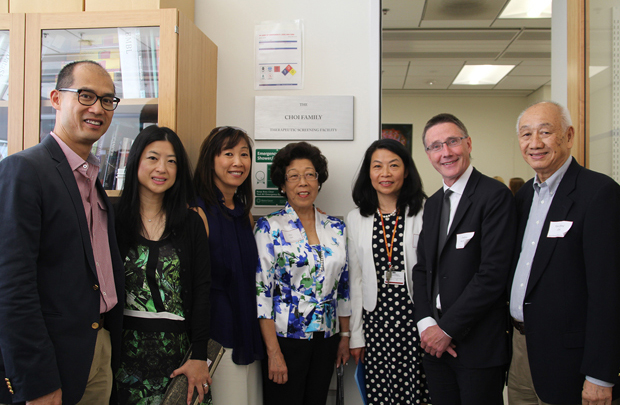How can scientists make more accurate predictions about which potential drugs will effectively treat disease — before launching expensive and laborious human clinical trials? USC’s new Choi Family Therapeutic Screening Facility offers one answer: through the “disease in a dish” approach.
At the grand opening on May 2, researchers thanked Kin-Chung Choi and his family for the generous gift that made the “disease in a dish” approach possible.
The approach involves reprogramming patients’ stem cells into their disease-affected cell types. This allows scientists to populate petri dishes with neural cells from patients with neurodegenerative diseases, inner ear cells from patients with hearing loss or balance disorders, and other cell types relevant to a wide variety of medical conditions. These “diseases in a dish” can then be used to test the effects of potential drugs on a patient’s actual cells.
Part of the Eli and Edythe Broad Center for Regenerative Medicine and Stem Cell Research at USC, the facility comprises extensive chemical libraries, state-of-the-art screening equipment and trained technicians — which will support researchers across the university.
“Stem cell research is such an exciting field for scientists now,” said Kin-Chung Choi. “Our family is honored to have the opportunity to learn alongside USC’s scientists and help them reach their potential in turning discoveries into cures.”
Justin Ichida, PhD, director of the screening facility and assistant professor of stem cell biology and regenerative medicine, highlighted his own promising work: conducting some of the first screens on Lou Gehrig’s disease using patient-specific cells.
Two of Ichida’s colleagues from the Department of Stem Cell Biology and Regenerative Medicine shared additional examples of how the facility is accelerating the development of new patient therapies.
Neil Segil, PhD, professor of research, talked about the quest for potential drugs that can regenerate inner ear cells as a treatment for hearing loss and balance disorders, which affect millions of people.
Min Yu, MD, PhD, assistant professor of stem cell biology and regenerative medicine, described how the facility will advance her breast cancer research, which involves filtering out circulating tumor stem cells from the blood to understand how the disease spreads and stop it in its tracks.
— Cristy Lytal


